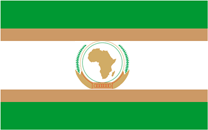- Birth of the African Union (FCN, 07-14-2002)
- African Union is made a reality (FCN, 07-24-2001)
- Birth of the African Union (Minister Louis Farrakhan, 07-24-2001)

UNITED NATIONS, Nov 7 (IPS) – As the increasing military tension in the Horn of Africa threatens to escalate into a new war between Ethiopia and Eritrea, the 53-member African Union (AU) plans to establish its first-ever standing army sometime next year.
The proposed African Standby Force (ASF) — to be set up with logistical support from Western nations — is designed primarily for military and peacekeeping missions in the war-ravaged continent.
Bill Fletcher Jr., president of the Washington-based TransAfrica Forum, agrees on the “absolute need” for a new African peacekeeping force under the leadership of the AU, as soon as feasible.
He warns that to get such a force institutionalized, there must be both financial and logistical support from non-African countries, mostly from the West.
“But such support should not be a means of manipulating the objective of such a force,” Fletcher told IPS.
In other words, “an African peacekeeping force must not be a neo-colonial military serving the interests of nations and institutions that wish to subvert African sovereignty”, he added.
An African diplomat told IPS that if and when the ASF is up and running, it could possibly strengthen or replace existing U.N. peacekeeping missions in the various trouble spots in Africa, including the disputed border between Ethiopia and Eritrea.
Of the 16 U.N. peacekeeping missions currently in force, eight are in Africa: Sierra Leone, the Democratic Republic of Congo (DRC), Liberia, Cote d’Ivoire, Ethiopia-Eritrea, Burundi, Sudan and Western Sahara.
Last week, Gen. Rajender Singh, commander of the U.N. Mission in Ethiopia and Eritrea (UNMEE), warned of a possible new war between the two African countries over continued disputes about their common border. The new threat of a war comes five years after the original conflict ended.
“The potentially volatile situation could lead to a renewed outbreak of war,” he added.
The ASB, whose creation was authorized by the AU back in 2002, will be mandated not only to support peace missions but also to intervene militarily to prevent escalating conflicts. Any decision to intervene, however, has to be approved by the AU’s General Assembly.
The 53 African nations that comprise the AU are expected to take steps to establish their own standby military contingents for participation in peacekeeping missions to be authorized by the Peace and Security Council of the AU.
At a U.N. press conference in mid-September, British Prime Minister Tony Blair said he expects the ASF to be in force by next year. The nucleus of the new force, he said, could be the nearly 1,000 AU peacekeepers currently in the Sudan.
“While the problem there was still critical,” he said, “it would have been worse without them. A capable African force allowed the political space for a process to work.” Blair insisted that “the African peacekeeping force must be in place by next year”.
Both the United States and the 25-member European Union have pledged unspecified financial support for the proposed new standing army.
Ann-Louise Colgan, director for policy analysis and communications at Africa Action, says while it is certainly important for the world’s rich countries to provide support for the peacekeeping efforts of the AU and African governments, this should not equate to a “hands-off” approach on the part of these countries when it comes to responding to crises in Africa.
“If African peacekeeping forces are to strengthen their capabilities and expand their operations in coming years, they will need international support,” Colgan told IPS.
But she warned that international support for peace and security efforts on the continent can and should take many forms, including diplomatic engagement, financial support, and capacity-building measures to reinforce African initiatives. And this will continue to be the case in the future, she added.
“Responding to major conflicts and related humanitarian crises, whether in Africa or elsewhere in the world, will always require international commitment and cooperation, and the United Nations and other international bodies will remain important fora to address these challenges,” Colgan added.
The new standby force will be established in two phases: the first ended last June, and the second is expected to end in June 2010.












